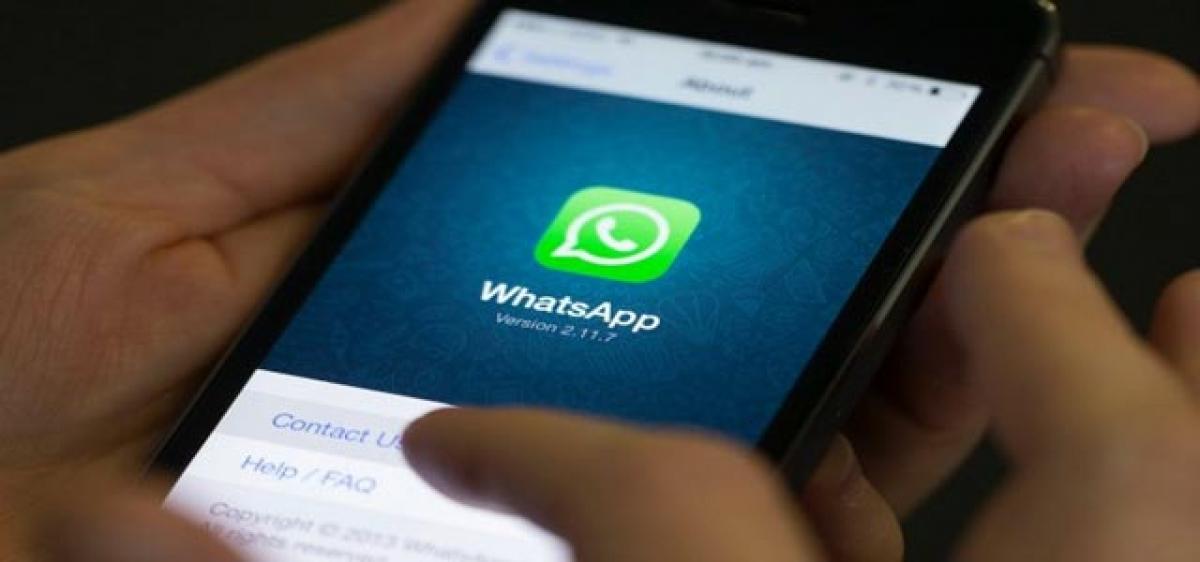Live
- GMR Airports Unveils AI-Powered Digital Twin Platform to Transform Airport Operations
- India poised to become leading maritime player: PM Modi
- Top Causes of Kidney Stones and How to Recognize Silent Symptoms
- India’s renewable energy capacity logs 14.2 pc growth at 213.7 GW
- Winter Session of Odisha Assembly adjourned sine die
- Biden calls Trump's tariff approach 'major mistake'
- After Drama Over Eknath Shinde’s Chief Minister Race, Maharashtra Cabinet Formation Faces New Tensions
- Egyptian FM, Blinken discuss recent developments in Syria
- Iran's supreme leader says Syria's developments result of US-Israeli 'plot'
- Elon Musk to Purchase $100 Million Luxury Mansion Next to Donald Trump's Mar-a-Lago, Report Reveals
Just In

If you are baffled at the speed at which jokes, videos and GIFs reach your WhatsApp account from groups or friends almost at the same time, remember that such posts are being planned and executed by teams sitting in some corner of the country to bombard the maximum number accounts at one go.
If you are baffled at the speed at which jokes, videos and GIFs reach your WhatsApp account from groups or friends almost at the same time, remember that such posts are being planned and executed by teams sitting in some corner of the country to bombard the maximum number accounts at one go.
With 160 million users in India, the Facebook-owned mobile messaging app has become a top choice among marketers, social influencers and certain groups to reach them via jokes, videos and GIFs whenever there is a breaking news, a major announcement, a tongue-in-cheek celebrity statement or even a festival, say experts.
"WhatsApp is emerging as a highly susceptible channel for propaganda, misinformation, fake news as well as highly influenceable from the targeted marketing message or advertisement perspective, i.e., digital word-of-mouth," Neil Shah, Research Director (Devices & Ecosystems) at the market research firm Counterpoint Research, said.
In India, WhatsApp has the highest penetration among any "social-centric" web/app platform available on the nearly 260 million active smartphone users. "Several marketers are leveraging an infantry of smart or influential folks to develop and spread targeted and viral-natured content. I believe the viral messages developed and spread are not by a single source but many individuals and firms working on this behind the scenes," Shah added.
There are ways to populate the sharing of such viral content but it can be defined in two parts content and objective. "While objectives and the purposes could be anything, one can easily relate these with driving mass awareness, creating social buzz, dragging public attention on political or public issues or making fun among friends or sharing memes or news," Anoop Mishra, one of the nation's leading social media experts, said.
Social media or digital marketing agencies work behind the content marketing strategies to make stories viral and shareable on WhatsApp. "Several FMCG companies, major political parties and politicians have their in-house sponsored team of social media warriors to generate and share such content or hashtags on various social media platforms," Mishra noted.
According to Shah, among several social media platforms, WhatsApp has a clear edge because of its user-friendly approach which has put the platform in a strong (as well as vulnerable position) for flow of both good and bad news or information or any content across the platform.
"Since the degree of separation among different WhatsApp users is theoretically lower, there is a high chance for any information to go viral faster than any other social media platform or even word-of-mouth," said Shah. With some 150 million active users in India, Facebook is the second-most used social media platform and can also act as a catalyst for proliferation of viral content due to a broader sharing and a greater engagement with the content.
"However, Facebook is quite curated and controlled via an algorithm according to a person's social graph and Facebook's advertising engine and, hence, potentially less viral than Whatsapp," Shah pointed out. Facebook's third property, Instagram, is also quickly rising to become a popular platform from the perspective of social media influencers to drive rich content for marketers and mainly target millennials.
Is there a revenue model in there for those making posts viral? "Absolutely, wherever there is a greater reach and high engagement for any platform, a potential revenue model certainly exists," Shah stated. Owing to its "no ads" DNA, WhatsApp has so far been resistant to a direct engagement-driven revenue model.
However, with Facebook connecting WhatsApp to its social graph, it unlocks potential for Facebook to work with marketers who, in turn, work with influencers to build a robust value chain. "Right now with WhatsApp its much more unorganised and influencers are earning directly from the marketers without any Facebook or Whatsapp intervention, unlike the Facebook or Instagram platforms," Shah said.
According to Mishra, the content is being prepared by digital marketing agencies with some earning prospects. "But the reality is that more than 80 per cent of the images or videos shared among the WhatsApp groups are downloaded from websites without any personal revenue benefits excepts some blogging sites which are paying their members for posts, comments, likes or to share contentson linked social profiles," Mishra said.
Recently, WhatsApp made extensive changes to its privacy policy, announcing it would and could share users' personal information, including their phone numbers, with its parent company Facebook a move that drew sharp criticism from privacy activists and the Delhi High Court in India. The move was touted as the first step towards monetising WhatsApp since Facebook acquired it for $19 billion in 2014.
"Right now, WhatsApp is quite fragmented and unorganised compared to Facebook. We believe this will change fast as Facebook tries to indirectly monetise the power of WhatsApp as a 'content sharing and targeting' platform," Shah added. -INS
By Nishant Arora

© 2024 Hyderabad Media House Limited/The Hans India. All rights reserved. Powered by hocalwire.com







